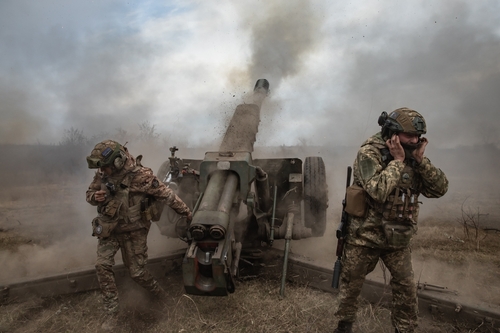Russian President Vladimir Putin has expressed a readiness to halt the conflict in Ukraine with a negotiated ceasefire that recognizes the current battlefield lines. This proposal comes amidst ongoing intense fighting and significant territorial control shifts.
According to sources close to the Kremlin, Putin is prepared to end hostilities, provided the ceasefire locks in Russia's current territorial gains. However, this proposal has been met with substantial skepticism from both Kyiv and Western allies.
🚨BREAKING: Putin offers truce if Ukraine exits Moscow-occupied areas and drops NATO bid.
Mark this post. Zelensky won’t accept the offer not because it’s not unreasonable but because his handlers won’t allow this gravy train to stop. pic.twitter.com/frpLFqEJtM
— I Meme Therefore I Am 🇺🇸 (@ImMeme0) June 14, 2024
The proposed ceasefire would freeze the conflict along the present frontlines, leaving Russia in control of parts of four Ukrainian regions—Donetsk, Luhansk, Zaporizhzhia, and Kherson. While these territories have been claimed by Russia since 2022, Moscow does not fully control any of them. Putin's insistence on maintaining these gains is seen as a strategic move to consolidate Russia's hold on these regions.
Ukrainian President Volodymyr Zelenskyy and his administration have dismissed the ceasefire proposal as a ploy. Zelenskyy has consistently vowed to reclaim all occupied territories, including Crimea, annexed by Russia in 2014. He has stated that any negotiations under the current conditions are unacceptable, emphasizing that peace talks must respect Ukraine's territorial integrity..
It's remarkable that NATO, rather than Zelensky, is providing the official response to Putin's peace proposal.
Who is in charge of Ukraine again? pic.twitter.com/fO7Ce8BUWk
— Russian Market (@runews) June 14, 2024
The international community has also reacted with caution. U.S. Secretary of State Antony Blinken, speaking recently in Kyiv, expressed doubts about Putin's sincerity in seeking peace. He underscored that any genuine peace initiative must honor Ukraine's internationally recognized borders. The U.S. State Department has reiterated that Russia has shown little genuine interest in ending the war, viewing Putin's proposals as attempts to blame Ukraine for the ongoing conflict.
The geopolitical implications of the ceasefire proposal are significant. Switzerland is set to host talks aimed at unifying international opinion on ending the war. However, these talks, initiated by Zelenskyy, have not invited Russia, casting doubt on their effectiveness. Putin has criticized these talks as biased, arguing that they aim to impose a total Russian withdrawal rather than facilitate genuine negotiations.
Meanwhile, the war continues to strain both Ukrainian and Russian resources. Ukraine, bolstered by a $61 billion U.S. aid package and additional European military support, is preparing for intensified combat. However, recruitment challenges and ammunition shortages remain significant hurdles. On the Russian side, there are concerns about the societal impact of returning battle-hardened veterans and the potential need for further mobilization, which has previously led to significant public discontent.
The situation remains fluid, with both sides preparing for further conflict even as diplomatic efforts continue. The outcome of the proposed ceasefire and subsequent negotiations will significantly shape the future of the region and international relations.




